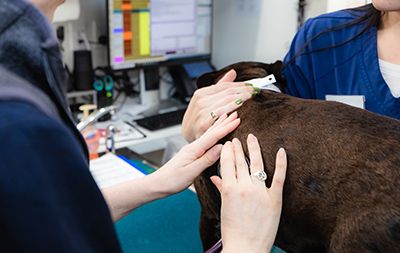Dog Deworming
At La Jolla Veterinary Hospital, we understand the importance of educating our clients about the best dog care practices. Among these is the prevention and detection of worms in our canine patients. After all, most dogs are at risk of contracting worms due to their social nature and active lifestyles.
As a dog owner, the idea of worms in your canine companion is always unpleasant. You do not want to think about creepy crawlies infecting your furry friend’s internal organs. However, we believe it is essential to understand the symptoms, treatment options, and risks of worms in dogs. Doing so is an integral part of responsible pet ownership.
What Is Dog Deworming?
Dog deworming involves getting rid of internal parasites in new dogs or puppies you bring into your household. Various parasites can pose a significant threat to canine health. Some can even transfer to humans.
Hence, we recommend deworming puppies every two to four weeks until they are three months old. They should then get treatments to prevent and eliminate parasites once a month until they are six months old. When bringing a new canine companion into your home, you should discuss a worm preventive protocol with your veterinarian.
Your vet will teach you how to spot common signs of worms in dogs. It would help to learn how to prevent the presence and spread of worms in your home.
Types of Canine Worms
There are several different types of dog worms. Some of the most common ones include:
Roundworms.
Tapeworms.
Whipworms.
Hookworms.
Ringworms.
Heartworms.
Tapeworms and roundworms are the two varieties of worms we see and treat most often in canines.
Symptoms of Worms in Dogs
Each type of worm affects dogs differently. However, there are some general signs and symptoms to watch out for if you are a dog owner. Some of these include:
Lethargy.
Diarrhea.
Dehydration.
Abdominal pain.
Vomiting.
Weight loss.
Pot-bellied appearance.
Poor coat appearance.
Anemia and nutrition deficiencies.
Blood in stool.
Pneumonia or intestinal blockage.
Heartworms can cause respiratory symptoms such as weight loss, weak pulse, exercise intolerance, coughing, and abdominal distension. In extreme cases, they can cause pale gums, labored breathing, and even death.
Roundworms in Dogs
These are some of the most common intestinal parasites in canines. Many puppies come into the world with roundworms obtained from their dam. That is why we recommend appropriate veterinary care and deworming for newborn pups. Left untreated, these worms can cause poor growth and even death in severe cases.
Tapeworms
Dogs acquire these intestinal parasites by consuming other animals infested with fleas or tapeworms or eating infected fleas. Once your dog ingests the flea, the tapeworm eggs will hatch and attach to your dog’s intestinal lining. Since tapeworms can pass from fleas to dogs, you should take flea prevention and deworming seriously.
Treating Dog Worms
As long as diagnosis and treatment happen before the advanced stages of infestation, dog worms are generally treatable. Your veterinarian will prescribe the proper deworming medications and appropriate administration protocol based on the type of worm and the extent of the infestation.
We recommend consulting a trained and licensed veterinarian before purchasing or giving your pooch any OTC medication for dog parasites. Only a trained professional can determine the problem’s severity and prescribe the proper treatment.
For more on dog deworming, visit La Jolla Veterinary Hospital at our office in La Jolla, California. Call (858) 454-6155 today to schedule an appointment.








